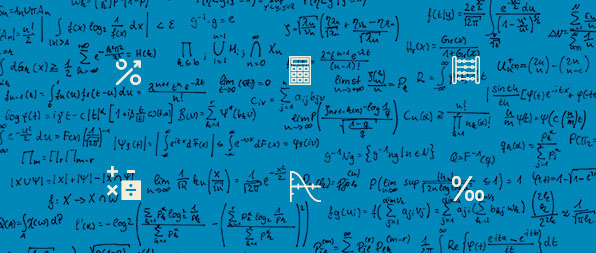Teachers’ mathematical discourses in instruction (MDIs), essentially the mathematical aspects of what teachers say, do and write as they interact with learners in mathematics classrooms, are a key feature of classroom practice. Typically, these MDIs include a problem, a selected representation that is subsequently transformed, and explanations and justifications for the representations selected and transformations performed. Our interest in this article is in developing a language that can be used to describe a range of MDIs. This interest is driven by our need to understand MDIs that seem to us to disrupt coherence and connection in mathematical text in a range of ways, and thus impact on what mathematics is made available to learn.
Transformation of representations, through manipulations within and across different representation forms, is a central feature of mathematical activity (Duval, 2006) and, therefore, of MDIs. Solving a problem in school mathematics often involves a set of steps through which one representation is transformed into another. For example, completing the square is comprised of a series of transformation steps that can act upon a quadratic function as input representation, if the stated problem is to find the turning point of the function. Consider the problem:
Find the turning point of f (x) = x2 − 8x + 9
The first step to solving this stated problem could be to recognise that rewriting a quadratic expression as a perfect square, plus or minus some constant, allows us to ‘see’ vertical and horizontal shifts with respect to the parent function, and so the turning point, more easily. We would thus rewrite the function in the form f (x) = a(x − p)2 + q by completing the square:
f (x) = x2 − 8x + 9
=x2 −8x+16–16+9
=(x−4)2 −7
What is important for this transformation activity1 is that within the MDI, the input representation introduced, the representations produced through transformation activity, and the accompanying explanations connect with each other and cohere with the stated problem. Our observations, across primary and secondary classrooms within our respective projects, suggest that such coherence or connection is frequently, but varyingly, disrupted within MDIs.
In this article, we share our development of an empirically derived analytical language (elements of which are italicised above) that allows us to make visible a range of disruptions to connection and coherence that come into play across four contrasting teaching episodes. We focus here on input objects, transformational activity and accompanying explanations in order to ‘see into’ the micro-level production of mathematics in classrooms through describing differences in the nature and degree of coherence and connection and to consider the consequences for what is made available to learn. This micro-level focus on specific episodes within lessons follows our observation of the occurrence of disruptions at this level, rather than at the broader level of lessons or lesson sequences that have been taken up in prior research (e.g. Sekiguchi, 2006).
In order to present our thinking on making aspects of connection and coherence visible within transformation activity, we begin with a brief overview of the literature. We draw on writing focused on transformation activity and representations as these actions and objects are at the centre of all our episodes and, as noted already, at the heart of mathematical activity more generally. We also summarise evidence that points to the shortcomings that characterise practices in which transformation steps are emphasised at the expense of gaining understanding of the representations they act upon. From this review, we outline the key concepts that we found helpful in beginning to pull apart some of the range of procedural practices that we were working with. Centrally, we home in on the stated problem, the selected input representation, subsequent sequences of transformation steps, and the interim and final representations produced in this sequence. These concepts are all covered in the literature we review.
Somewhat absent in this literature is a focus on the MDIs that accompany transformation activity. Teaching involves the giving of accompanying explanations alongside transformation and so, unlike the (often predictably) piecemeal learner discourses that are in focus in much of the literature on transformation-oriented activity, one expects MDIs to be both coherent and connected, and to provide some of the rationales for the representations selected and transformation activity that is enacted. As noted above however, we see this expectation disrupted relatively frequently, and in a range of different ways. In order to consider the nature of these disruptions to coherence, we use a tentative set of framing questions, drawn from our grounded analysis of the episodes presented in this article, to analyse and differentiate the transformation activity in four selected teaching episodes. This could be criticised as somewhat circular: developing grounded framing questions from a dataset, and then using them to analyse the same dataset. Our aim in doing this is to share this set of literature-drawn concepts and grounded framing questions in order to start conversations across the mathematics teaching and teacher education communities that can help to build a more robust language for thinking about what constitutes coherence and connection within mathematics teaching. We have already been through several iterations of concepts and framing questions, and have seen that our current formulation can be applied to a significantly broader group of episodes that we have encountered.
Download Proof
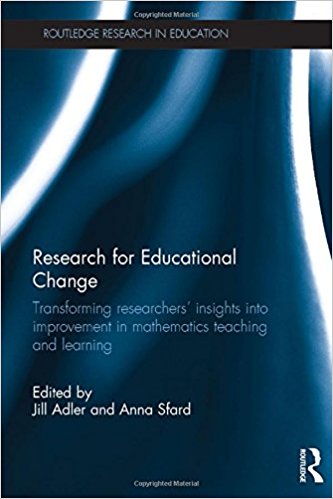 How can educational research fulfill its commitment to educational practice? This time-honored question is the one that gave rise to this book. The more specific query of how to bridge research and practice in conditions of poverty and inequality became its main focus. Within the context of mathematics education, this single, all- encompassing problem can be decomposed into three separate issues, each of which is serious enough to keep researchers awake at night. First, how can one explain the lingering, pervasive failure in mathematics experienced by so many students around the world, but especially by those who live in conditions of scarcity and social injustice?
How can educational research fulfill its commitment to educational practice? This time-honored question is the one that gave rise to this book. The more specific query of how to bridge research and practice in conditions of poverty and inequality became its main focus. Within the context of mathematics education, this single, all- encompassing problem can be decomposed into three separate issues, each of which is serious enough to keep researchers awake at night. First, how can one explain the lingering, pervasive failure in mathematics experienced by so many students around the world, but especially by those who live in conditions of scarcity and social injustice?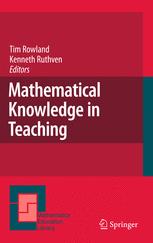 The QUANTUM research project in South Africa has as its central concern answering the question of what is constituted as mathematics in and for teaching in formalised in-service teacher education in South Africa and how it is constituted. Entailed in the question is an understanding that, in practice, selections of content in mathematics teacher education are varyingly drawn from mathematics and the arena of education (including mathematics education, teacher education and teaching experience). Debate continues as to whether and how mathematics teacher education programmes should integrate or separate out opportunities to learn mathematics and teaching. Programmes range across a spectrum of integration and separation of mathematics and teaching, including variations in the degree to which opportunities for teachers to learn both mathematics and teaching are presented as embedded in problems of practice.
The QUANTUM research project in South Africa has as its central concern answering the question of what is constituted as mathematics in and for teaching in formalised in-service teacher education in South Africa and how it is constituted. Entailed in the question is an understanding that, in practice, selections of content in mathematics teacher education are varyingly drawn from mathematics and the arena of education (including mathematics education, teacher education and teaching experience). Debate continues as to whether and how mathematics teacher education programmes should integrate or separate out opportunities to learn mathematics and teaching. Programmes range across a spectrum of integration and separation of mathematics and teaching, including variations in the degree to which opportunities for teachers to learn both mathematics and teaching are presented as embedded in problems of practice.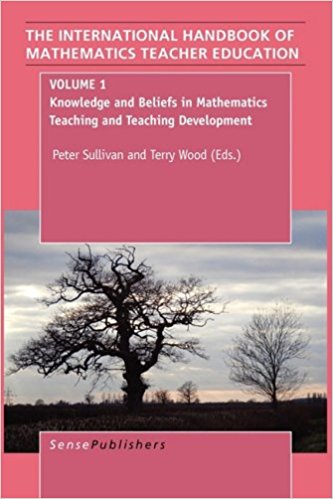 This chapter aims to show the impact of culture on the learning of mathematics and consequently that studies of mathematics for teaching require strong theoretical frameworks that foreground the relationship between culture and pedagogy. For this purpose, we describe two different research projects in Southern Africa, each focused on the notion of mathematics for teaching. The first study analyses teacher learning of the mathematical concept of limits of functions through participation in a research community in Mozambique, and is framed by Chevallard’s anthropological theory of didactics. The second, the QUANTUM project, studies what and how mathematics is produced in and across selected mathematics and mathematics education courses in in-service mathematics teacher education programmes in South Africa, and is shaped by Bernstein’s theory of pedagogic discourse. We argue that separately and together these two studies demonstrate that mathematics for teaching can only be grasped through a language that positions it as structured by, and structuring of, the pedagogic discourse (in Bernstein’s terms) or the institution (in Chevallard’s terms) in which it ‘lives’.
This chapter aims to show the impact of culture on the learning of mathematics and consequently that studies of mathematics for teaching require strong theoretical frameworks that foreground the relationship between culture and pedagogy. For this purpose, we describe two different research projects in Southern Africa, each focused on the notion of mathematics for teaching. The first study analyses teacher learning of the mathematical concept of limits of functions through participation in a research community in Mozambique, and is framed by Chevallard’s anthropological theory of didactics. The second, the QUANTUM project, studies what and how mathematics is produced in and across selected mathematics and mathematics education courses in in-service mathematics teacher education programmes in South Africa, and is shaped by Bernstein’s theory of pedagogic discourse. We argue that separately and together these two studies demonstrate that mathematics for teaching can only be grasped through a language that positions it as structured by, and structuring of, the pedagogic discourse (in Bernstein’s terms) or the institution (in Chevallard’s terms) in which it ‘lives’. Mathematics teacher education can be seen as directly related to activity in mathematics classrooms and the success (or other) of students learning mathematics worldwide. In what ways does what is published in the field of mathematics teacher education inform us about key question and issues, about programmes for educating teachers, and about research findings? We refer specifically to an International Congress on Mathematical Education (ICME) survey (with Adler as chair) and to the Journal of Mathematics Teacher Education (JMTE), the leading journal in the field (with Jaworski as editor in chief).
Mathematics teacher education can be seen as directly related to activity in mathematics classrooms and the success (or other) of students learning mathematics worldwide. In what ways does what is published in the field of mathematics teacher education inform us about key question and issues, about programmes for educating teachers, and about research findings? We refer specifically to an International Congress on Mathematical Education (ICME) survey (with Adler as chair) and to the Journal of Mathematics Teacher Education (JMTE), the leading journal in the field (with Jaworski as editor in chief).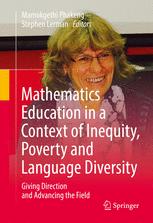 This volume is dedicated to the career of Jill Adler and the role she has played in growing mathematics education research in South Africa, Africa and beyond. Her work epitomises what is referred to as the ‘engaged scholar’: i.e. doing rigorous and theoretically rich research at the cutting edge of international work in the field which at the same time contributes to critical areas of local and regional need in education. Jill is one of the world’s leading experts in mathematics education research and her exemplary career is a continuous source of inspiration for generations of researchers and students. The chapters in this volume are authored by Jill’s former PhD students, a few select colleagues from different parts of the world that she collaborated with as well as leading scholars who she worked with in PME, ICMI and in her many international assignments. In essence, this volume celebrates Jill’s contribution not only to mathematics education but also to our contributions as her friends and colleagues. Topics covered include language and mathematics, teacher education, and the dilemma of an activist researcher engaging in issues that matter hugely to the participants in the research, students and teachers in post-apartheid schooling, whilst also setting up the separation that is needed for good research.
This volume is dedicated to the career of Jill Adler and the role she has played in growing mathematics education research in South Africa, Africa and beyond. Her work epitomises what is referred to as the ‘engaged scholar’: i.e. doing rigorous and theoretically rich research at the cutting edge of international work in the field which at the same time contributes to critical areas of local and regional need in education. Jill is one of the world’s leading experts in mathematics education research and her exemplary career is a continuous source of inspiration for generations of researchers and students. The chapters in this volume are authored by Jill’s former PhD students, a few select colleagues from different parts of the world that she collaborated with as well as leading scholars who she worked with in PME, ICMI and in her many international assignments. In essence, this volume celebrates Jill’s contribution not only to mathematics education but also to our contributions as her friends and colleagues. Topics covered include language and mathematics, teacher education, and the dilemma of an activist researcher engaging in issues that matter hugely to the participants in the research, students and teachers in post-apartheid schooling, whilst also setting up the separation that is needed for good research.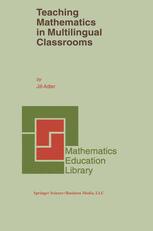 Increasingly, teachers all over the world are grappling on a daily basis with the fact of multilingual classrooms. In this book, Jill Adler captures three inter-related dilemmas that lie at the heart of teaching mathematics in multilingual classrooms. Adler’s identification and naming of the dilemma of code-switching, the dilemma of mediation, and the dilemma of transparency, arise from exploring the realities of actual classrooms, and are shaped by a perspective of teaching as a social practice.
Increasingly, teachers all over the world are grappling on a daily basis with the fact of multilingual classrooms. In this book, Jill Adler captures three inter-related dilemmas that lie at the heart of teaching mathematics in multilingual classrooms. Adler’s identification and naming of the dilemma of code-switching, the dilemma of mediation, and the dilemma of transparency, arise from exploring the realities of actual classrooms, and are shaped by a perspective of teaching as a social practice.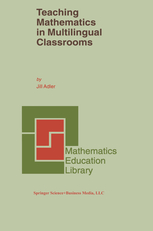 In this chapter, we draw substantially on Wenger’s (1998) Communities of Practice (CoP) theory to develop and then propose a methodological approach for analysing pre-service mathematics teacher education multilingual classrooms. The approach emerged in Essien’s (2013) study that investigated how pre-service mathematics teachers were being prepared to teach mathematics in multilingual contexts. Like many others in mathematics education, the theoretical frame for the study drew from a disciplinary domain in the social sciences to investigate the teaching and learning of mathematics. But why Wenger, and his theory of learning through participation in a community of practice, particularly given that Wenger’s CoP theory was developed from studying informal learning settings?
In this chapter, we draw substantially on Wenger’s (1998) Communities of Practice (CoP) theory to develop and then propose a methodological approach for analysing pre-service mathematics teacher education multilingual classrooms. The approach emerged in Essien’s (2013) study that investigated how pre-service mathematics teachers were being prepared to teach mathematics in multilingual contexts. Like many others in mathematics education, the theoretical frame for the study drew from a disciplinary domain in the social sciences to investigate the teaching and learning of mathematics. But why Wenger, and his theory of learning through participation in a community of practice, particularly given that Wenger’s CoP theory was developed from studying informal learning settings?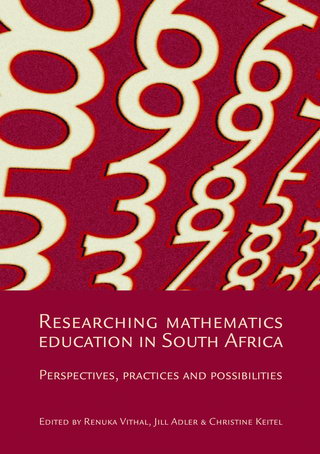 The mathematics education research community in South Africa has grown markedly over the past decade. Key educational concerns have been subjected to systematic study and, increasingly, researchers have become established nationally and internationally. The papers brought together in this book capture some of this growth in mathematics education research in South Africa – in both human and knowledge resource terms. The authors of the various chapters are located across a range of institutional settings and they address a healthy diversity of interest and concerns. While many of the issues raised are resonant with issues in the wider field, each chapter, in one way or another, brings the specificity of the South African context to the fore, and so shapes the questions asked and illuminates the problems studied in particular ways. In bringing together these discussions of research issues in this book, we hope, indeed intend, that we have produced a collection that will be not only a resource for graduate students, and those involved in research and policy development and implementation in South Africa, but will also be of value in the wider international field of mathematics education research.
The mathematics education research community in South Africa has grown markedly over the past decade. Key educational concerns have been subjected to systematic study and, increasingly, researchers have become established nationally and internationally. The papers brought together in this book capture some of this growth in mathematics education research in South Africa – in both human and knowledge resource terms. The authors of the various chapters are located across a range of institutional settings and they address a healthy diversity of interest and concerns. While many of the issues raised are resonant with issues in the wider field, each chapter, in one way or another, brings the specificity of the South African context to the fore, and so shapes the questions asked and illuminates the problems studied in particular ways. In bringing together these discussions of research issues in this book, we hope, indeed intend, that we have produced a collection that will be not only a resource for graduate students, and those involved in research and policy development and implementation in South Africa, but will also be of value in the wider international field of mathematics education research.